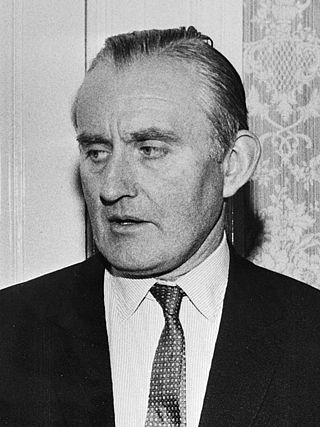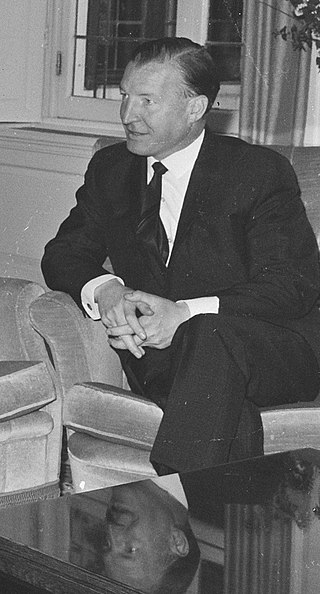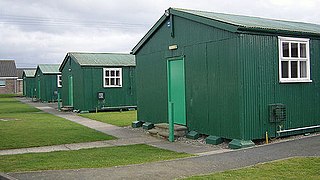Contents
| |||||
| Centuries: | |||||
|---|---|---|---|---|---|
| Decades: | |||||
| See also: | |||||
Events during the year 1971 in Northern Ireland .
| |||||
| Centuries: | |||||
|---|---|---|---|---|---|
| Decades: | |||||
| See also: | |||||
Events during the year 1971 in Northern Ireland .

The Troubles were an ethno-nationalist conflict in Northern Ireland that lasted for about 30 years from the late 1960s to 1998. Also known internationally as the Northern Ireland conflict, it began in the late 1960s and is usually deemed to have ended with the Good Friday Agreement of 1998. Although the Troubles mostly took place in Northern Ireland, at times violence spilled over into parts of the Republic of Ireland, England, and mainland Europe.
Arthur Brian Deane Faulkner, Baron Faulkner of Downpatrick,, was the sixth and last Prime Minister of Northern Ireland, from March 1971 until his resignation in March 1972. He was also the chief executive of the short-lived Northern Ireland Executive during the first half of 1974.

James Dawson Chichester-Clark, Baron Moyola, PC, DL was the penultimate Prime Minister of Northern Ireland and eighth leader of the Ulster Unionist Party between 1969 and March 1971. He was Member of the Northern Ireland Parliament for South Londonderry for 12 years, beginning at the by-election to replace his grandmother, Dame Dehra Parker in 1960. He stopped being an MP when the Stormont Parliament was suspended and subsequently abolished with the introduction of Direct Rule by the British Government.

The Northern Ireland border poll was a referendum held in Northern Ireland on 8 March 1973 on whether Northern Ireland should remain part of the United Kingdom or join with the Republic of Ireland to form a united Ireland. It was the first time that a major referendum had been held in any region of the United Kingdom. The referendum was boycotted by nationalists and resulted in a conclusive victory for remaining in the UK. On a voter turnout of 58.7 percent, 98.9 percent voted to remain in the United Kingdom, meaning the outcome was not affected by the boycott.
Events in the year 1972 in Ireland.
Events in the year 1971 in Ireland.
Events in the year 1969 in Ireland.

The Arms Crisis was a political scandal in the Republic of Ireland in 1970 in which Charles Haughey and Neil Blaney were dismissed as cabinet ministers for alleged involvement in a conspiracy to smuggle arms to the Irish Republican Army in Northern Ireland. At the ensuing Arms Trial, charges against Blaney were dropped, and Haughey, along with co-defendants Captain James Kelly, John Kelly and Belgian businessman Albert Luykx, were found not guilty of conspiracy. Blaney claimed that the then government knew about the plan, while Haughey denied this.

Operation Demetrius was a British Army operation in Northern Ireland on 9–10 August 1971, during the Troubles. It involved the mass arrest and internment of people suspected of being involved with the Irish Republican Army (IRA), which was waging an armed campaign for a united Ireland against the British state. It was proposed by the Unionist government of Northern Ireland and approved by the British Government. Armed soldiers launched dawn raids throughout Northern Ireland and arrested 342 in the initial sweep, sparking four days of violence in which 20 civilians, two IRA members and two British soldiers were killed. All of those arrested were Irish republicans and nationalists, the vast majority of them Catholics. Due to faulty and out-of-date intelligence, many were no longer involved in republican militancy or never had links with the IRA. Ulster loyalist paramilitaries were also carrying out acts of violence, which were mainly directed against Catholics and Irish nationalists, but no loyalists were included in the sweep.

Operation Banner was the operational name for the British Armed Forces' operation in Northern Ireland from 1969 to 2007, as part of the Troubles. It was the longest continuous deployment in British military history. The British Army was initially deployed, at the request of the unionist government of Northern Ireland, in response to the August 1969 riots. Its role was to support the Royal Ulster Constabulary (RUC) and to assert the authority of the British government in Northern Ireland. This involved counter-insurgency and supporting the police in carrying out internal security duties such as guarding key points, mounting checkpoints and patrols, carrying out raids and searches, riot control and bomb disposal. More than 300,000 soldiers served in Operation Banner. At the peak of the operation in the 1970s, about 21,000 British troops were deployed, most of them from Great Britain. As part of the operation, a new locally-recruited regiment was also formed: the Ulster Defence Regiment (UDR).
Events during the year 1972 in Northern Ireland.
Events during the year 1970 in Northern Ireland.
Events during the year 1969 in Northern Ireland.
William Joseph Long OBE was a Unionist politician in Northern Ireland.

The Ballymurphy massacre was a series of incidents between 9 and 11 August 1971, in which the 1st Battalion, Parachute Regiment of the British Army killed eleven civilians in Ballymurphy, Belfast, Northern Ireland, as part of Operation Demetrius. The shootings were later referred to as Belfast's Bloody Sunday, a reference to the killing of civilians by the same battalion in Derry a few months later, known as Bloody Sunday. The 1972 inquests had returned an open verdict on all of the killings, but a 2021 coroner's report found that all those killed had been innocent and that the killings were "without justification".
The Springhill massacre was an incident in which five Catholic residents were killed by the British Army in the Springhill estate in West Belfast, Northern Ireland, on 9 July 1972, during the Troubles. Three of the victims were teenagers, including a 13-year-old girl, and another was a Catholic priest waving a white flag as he went to attend one of the injured.

The 1971 Scottish soldiers' killings took place in Northern Ireland during The Troubles. On 10 March 1971, the Provisional Irish Republican Army (IRA) shot dead three off-duty British soldiers of the 1st Battalion, Royal Highland Fusiliers. The soldiers were from Scotland and two were teenage brothers. They were lured from a pub in Belfast where they had been drinking, driven to a remote location and shot by the roadside. Three British soldiers had been killed before this, but all had been killed during rioting.

The Springfield Road is a residential area and road traffic thoroughfare adjacent to the Falls Road in west Belfast. The local population is predominantly Irish nationalist and republican. Along parts of the road are several interface area with the neighbouring Ulster loyalist areas of the Greater Shankill. The Springfield Road includes the Ballymurphy and New Barnsley districts and is overlooked by Black Mountain and Divis.

Abercorn Barracks, sometimes referred to as Ballykinlar Barracks or Ballykinler Barracks, is a former military base in Ballykinler in County Down, Northern Ireland. The surrounding training area is retained by the Ministry of Defence.